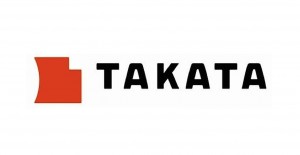The Japanese auto supplier at the center of a massive recall of due to potentially explosive airbags, Takata Corp., is also mired in a criminal price-fixing investigation by the Department of Justice.
Four Takata executives pleaded guilty to price-fixing charges brought by the Justice Department’s anti-trust division, which charged the company’s executives with colluding with other suppliers to rig bids for seat belts against Honda, Toyota and Mazda.
In addition to the charges by the DOJ, the U.S. District Court in Eastern District of Michigan has levied fines against Takata totaling more than $71 million. All three Japanese carmakers also have been heavily impacted by the concerns over airbags supplied by Takata, which have exploded and in a number of cases injured motorists.
The National Highway Transportation Safety Administration has labeled the airbags from Takata, which forced a recall of 7.8 million vehicles from model year 2000 and newer, a potential hazard.
Gikou Nakajima, the highest-ranking global sales executive at Takata, agreed to rig bids for seatbelts sold to Toyota, Honda, Mazda, Nissan Motor Co. and Fuji Heavy Industries Ltd. — the makers of Subaru vehicles — in a scheme that stabilized and maintained set prices for the parts, according to the federal indictment filed in June.
Nakajima was the director of customer relations as Takata from June 2005 until at least June 2009, prosecutors said.
From September 2005 to June 2009, Nakajima attended meetings with co-conspirators and reached collusive agreements to rig bids, allocate the supply and fix the prices of seat belts sold to auto manufacturers in the U.S. and elsewhere, according to prosecutors, federal prosecutors said.
Nakajima directed, authorized and consented to his subordinates’ participation, prosecutors said.
In November, three other Takata employees — Yasuhiko Ueno, Saburo Imamiya and Yoshinobu Fujino — were charged one count each of conspiracy to rig bids and fix prices for seat belts used in cars sold in the U.S., according to the DOJ. All three, like Nakajima, were in customer relations.
All three have agreed to cooperate with the agency and serve prison terms in the U.S., the DOJ said.
(NHTSA’s Friedman apologizes for Takata recall snafu. For more, Click Here.)
During the time the plot allegedly ran from 2004 through early 2011, Ueno held a variety of positions in Takata and in its U.S. unit, including senior vice president for sales and director of customer relations. Imamiya was general manager of the company’s Toyota sales unit as well as director of customer relations. Fujino was manager of customer relations for Toyota and Mazda.
All three have agreed to pay $20,000 criminal fines. In addition, Ueno will serve 19 months in prison; Imamiya will serve 16 months and Fujino 14 months under the terms of their plea agreements with the DOJ.
(Click Here for details about Ford’s third-quarter earnings.)
Prosecutors said that including Nakajima, 35 individuals have been charged in the government’s ongoing investigation into price fixing and bid rigging in the auto parts industry, 24 of whom have pleaded guilty or agreed to plead guilty. Of those, 22 have been sentenced to serve prison terms ranging from a year and one day to two years. Additionally, 27 companies have pleaded guilty or agreed to plead guilty and have agreed to pay a total of more than $2.3 billion in fines.
So far, Takata’s response has been to issue a statement, saying it regretted the action of its employees.
On the airbag recalls, Takata said the company believed excessive moisture was the cause of the defect. Takata officials also admitted they had mishandled the manufacture of explosive propellants and improperly stored chemicals used in airbags.
(To see more about Audi adding 850,000 more vehicles to airbag recall list, Click Here.)
An additional difficultly to identifying vehicles with defective airbags was their failure to keep proper records of quality control. This prompted the second round of recalls.
Japanese authorities have cooperated completely with the U.S. investigation into price fixing of automotive fixing, U.S. Department of Justice officials have said.
In 2012, Takata acquired BAE Safety Products, Inc. and Schroth Safety Products GmbH for $32 million, strengthening its positions as the world’s top supplier of airbags with about 23% marketshare.
Based in Tokyo, Japan, Takata is a major manufacturer of motor vehicle seat belts, restraints, airbags and interior trim with 49 plants in 18 countries but now faces intense pressure from competitors that are looking to expand at its expense.


They will declare bankruptcy and open the next day as some new company, shedding all responsibility for the airbag issue. It happens all the time.
is my 09 ford fushion on the airbag recall
Hi, Ina,
Go to your maker’s website and look for their recall page, or go to safercar.gov, the NHTSA page, and link to their recall page. There you can enter your vehicle’s VIN.
Paul A. Eisenstein
Publisher, TheDetroitBureau.com